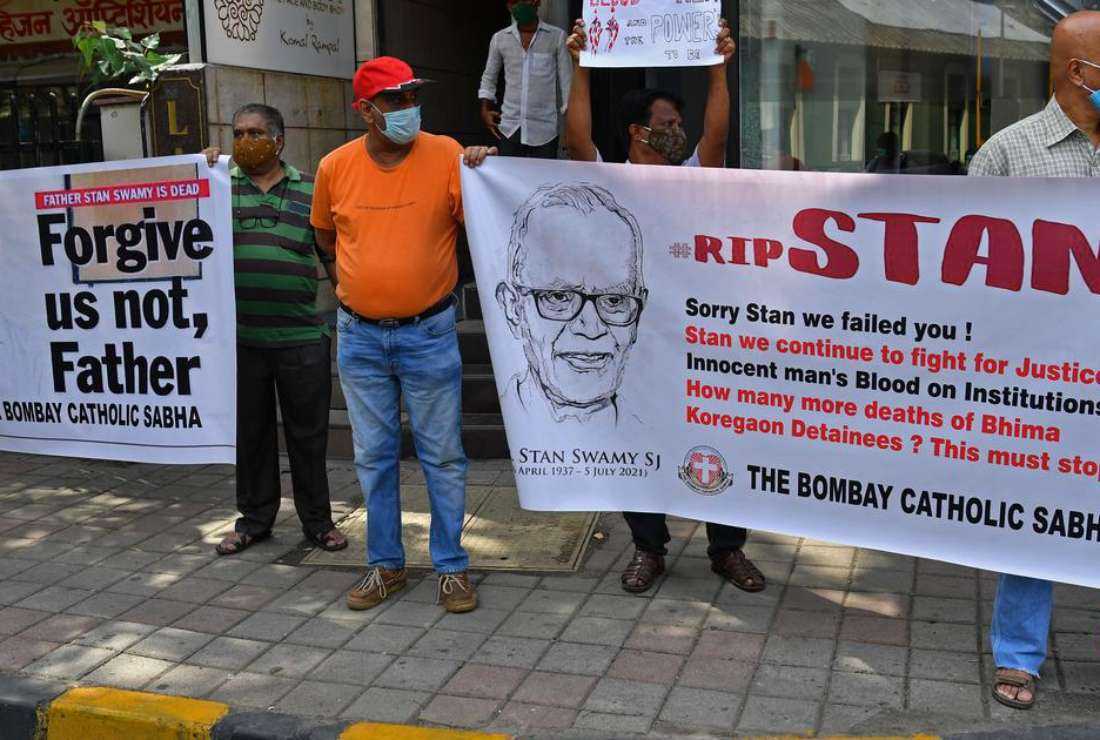Counterterrorism law, financial regulations are used to target, intimidate, harass, and punish critics, rights groups say

Catholics join a protest in Mumbai, in India after activist and Jesuit priest Stan Swamy, who was detained for nine months without trial under anti-terrorism laws, died on July 5, 2021. Rights groups have accused the Indian government of abusing laws to target rights activists.(Photo: AFP)
Three global rights groups have urged the Indian government to stop targeting rights activists by abusing counterterrorism and financial laws and called on a major terror financing and money laundering watchdog to intervene.
The Indian government is “weaponizing” the laws to detain and punish rights activists, Human Rights Watch (HRW), Amnesty International, and the Charity & Security Network said in a joint statement on Nov. 3.
The counterterrorism law has been used to level “unfounded charges” against activists, said Aakar Patel from Amnesty International India.
“Authorities are using bogus foreign funding and terrorism charges to target, intimidate, harass, and silence critics, in clear violation of Financial Action Task Force [FATF] standards,” Patel added.
The FATF, which India joined in 2010, is a 40-member country body mandated to tackle money laundering, terror financing, and other threats to the integrity of the global financial system.
The rights groups’ statement came just days before the FATF’s fourth periodic review of India’s record on tackling illicit funding on Nov. 6.
They accused the Indian government of exploiting FATF recommendations “to restrict civic space and stifle the rights to freedom of expression, association, and peaceful assembly.”
The group singled out use of the draconian Foreign Contribution (Regulation) Act (FCRA), the Unlawful Activities (Prevention) Act (UAPA), and the Prevention of Money Laundering Act (PMLA) to suppress dissent.
Misuse of the FCRA
“Their actions have flouted both FATF standards and international human rights law,” the groups alleged.
The Indian government has used “overly broad provisions in domestic law to silence critics and shut down their operations,” they said.
Since the Hindu nationalist Bhartiya Janata Party (BJP) came to power in 2014, the administration has resorted to canceling foreign funding licenses of activist groups and has begun prosecuting them using the counterterrorism law and financial regulations.
The FCRA was enacted in 1976 to prevent and regulate foreign interference in Indian politics.
In 2010, the government “repurposed” the legislation with a greater focus on nonprofit organizations, “while relaxing foreign funding oversight for political parties,” the groups said.
The government has canceled the licenses of over 20,600 nonprofit organizations, including 6,000 in 2022, blocking their access to foreign funding.
In July 2022, the Home Affairs Ministry deleted the list of nonprofit organizations whose FCRA licenses had been canceled without any explanation and stopped publishing this data, the groups said.
“The Indian government has particularly targeted human rights groups and activists working to protect the rights of the most socially and economically marginalized populations,” the groups added.
Misuse of the UAPA
The groups also claimed the Indian government has frequently used its primary counterterrorism law, the UAPA, to arbitrarily arrest and detain human rights defenders and activists.
The UAPA was introduced to reform the draconian Prevention of Terrorism Act (POTA) in 2004. It was amended in 2008, 2012, and 2019 allegedly to include problematic provisions in the POTA.
The changes “include its overly broad definition of a ‘terrorist act,’ reversal of the presumption of innocence, and provisions for prolonged detention without trial or charge,” the groups said.
India amended the UAPA in 2012 to satisfy FATF conditions by including threats to economic security and extended the definition of a “person” liable to be charged under that law to international and intergovernmental organizations.
The 2019 amendment extended the law’s applicability from organizations and groups to individuals as well.
The counterterrorism funding provisions of the UAPA have been misused against several student activists who organized protests against the controversial Citizenship Amendment Act.
The protesting students were accused of “orchestrating” February 2020 Delhi riots that killed at least 53 people, mostly Muslims.
The law was also used against 16 human rights activists, eight of whom have remained detained without trial following violence at a gathering in Bhima-Koregaon which left two people dead and injured 35 in 2018.
The activists also included the late Jesuit priest, Stan Swamy, who was accused of having links with outlawed Maoists and died while on remand on July 5, 2021.
Other prominent figures include Kashmiri human rights activist Khurram Parvez, and Irfan Mehraj, a journalist associated with the Jammu Kashmir Coalition of Civil Society.
Only 2.2 percent of cases registered under the UAPA in 2016-2019 ended in a court conviction, nearly 11 percent were dismissed for lack of evidence, and the rest remain pending, the rights groups said.
“The delay in filing charges and several acquittals in these cases show that the government is using the counterterrorism law to keep critics locked up for years and use the judicial process as a tool to persecute and punish critics,” they alleged.
Misuse of money laundering act
India’s anti-money laundering law, popularly known as the PMLA was used “to attack, intimidate, and harass human rights defenders, activists, and nonprofit organizations” by seizing their properties, and burdening them with stringent bail conditions, the groups said.
A prime example of such abuse was the freezing of Amnesty International India’s bank account in September 2020 that put its work on hold for three years. It did not even have funds to even secure effective legal representation.
“India’s three laws together have created a dangerous arsenal with debilitating consequences for civil society and human rights activists,” said Meenakshi Ganguly, deputy Asia director at HRW.
“The FATF should not allow the Indian government to exploit the organization’s recommendations for its political purposes — to silence all forms of dissent,” he said.

